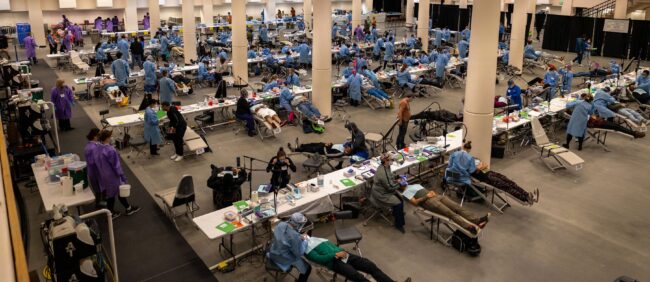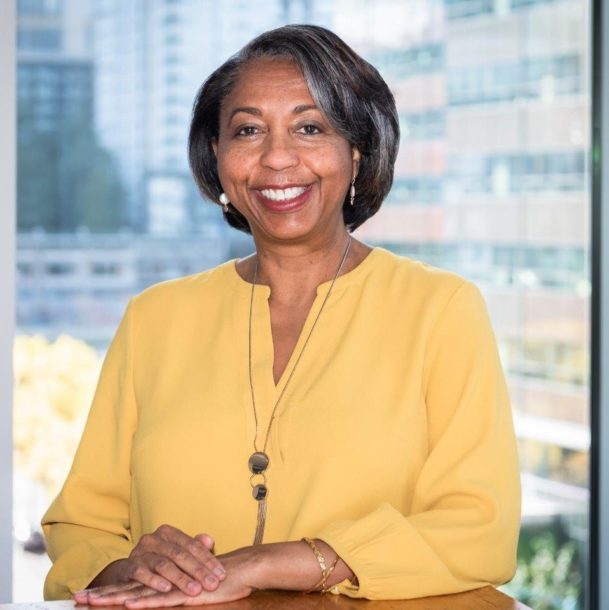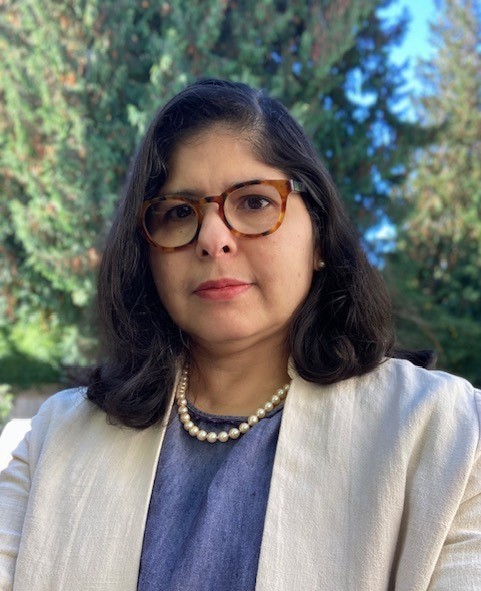
By Vanetta Abdellatif and Luzmila Freese
(Originally published in 2024 ahead of that year’s Seattle/King County Clinic.)
Every year, Seattle Center hosts a four-day, pop-up clinic that attracts thousands of people. Seattle/King County Clinic (SKCC) provides free, quality dental, vision, and medical services for people who face barriers to care.
SKCC (Feb. 15-18)—a collaborative effort between the Seattle Center Foundation and thousands of compassionate health care professionals, volunteers, and community and health organizations—offers first come-first served care to all regardless of insurance or residence status or ability to pay. People who seek care at the clinic could be our neighbors, family, friends, and community members we all encounter each day: lower-wage workers, older adults on fixed incomes, young people just starting out, people with disabilities, and uninsured or underinsured households.
Arcora Foundation is once again a proud SKCC sponsor. Arcora’s SmileMobile—a dental office on wheels that travels across the state—will provide dental services at the clinic. For ongoing care, patients will have access to DentistLink—a no-cost referral service for people with Apple Health (Medicaid) or no insurance fully funded by Arcora and the Washington State Health Care Authority. Dental care historically is the most requested service at the clinic.
At the heart of the SKCC effort is a commitment to break down barriers to access care and ensure everyone can enjoy the benefits of improved health. This is a deeply personal matter for us.
We know firsthand that access to timely oral health services from providers who understand and care about you can change your life:
- Vanetta—My family experienced many periods without dental insurance here in the U.S., and we frequently had to forego preventive care and regular dental visits. Fortunately, I grew up in a city where the water was naturally fluoridated, so we benefited from the protective qualities of a good balance of fluoride in our tap water. Fluoridation is an effective and equitable way to prevent tooth decay for people of all backgrounds.
- Luzmila—I grew up in a developing country where preventive dental care was not a common practice. Dental visits were often reserved for situations when pain became unbearable or for emergencies. We did have fluoridated water and a health care system that provided based on a person’s health needs and not on their ability to pay. Through my work here in Washington state, I have witnessed the impact a simple 60-minute regular check-up and cleaning session can have on a person’s quality of life and general wellbeing. This sharp contrast in accessibility to dental and health care is what has and continues to inspire me to do this work.
SKCC serves primarily King County residents. It also attracts people from across the state because they can get free care for immediate and unmet needs. But only 3,000 or so people who often must arrive before sunrise, wait in line for hours, and are fortunate enough to get admissions tickets will receive care. While the annual clinic excels at offering compassionate and quality care, waiting an entire year to access critical services at a temporary clinic is not good health policy. We must commit to make sustainable, long-term care options available to everyone, so that one day the SKCC is no longer needed.
The state legislature has shown their commitment and leadership to oral and overall health. In the 2023 legislative session, lawmakers approved $500,000 over the 2023-2025 biennium to continue the public-private partnership so DentistLink can continue to connect more patients to care. In recent sessions lawmakers have significantly increased our state’s investment in both the pediatric and adult Apple Health (Medicaid) dental programs with the goal of increasing access to care. And we are excited about the Apple Health Expansion later this year, which will extend Medicaid-similar coverage, including dental, to even more people who face challenges to access care.
These are important and exciting steps forward. We call on policy makers, providers, and patient advocates to continue to collaborate to make more sustainable investments in care. Supporting capital investments at local community health centers and the University of Washington’s Regional Initiatives in Dental Education (RIDE) program can expand access to communities facing the greatest dental care needs in rural, suburban, and urban communities.
As we celebrate the accomplishments of SKCC, it is imperative to also recognize the work we must do so that no one is left behind. We must be bold and dare to rethink the way we approach health care delivery, emphasizing the importance of policies and expanding access that furthers health equity.


Vanetta Abdellatif is president and CEO of Arcora Foundation—the state’s largest foundation dedicated to advance oral health—whose mission is to bend the arc of oral health toward equity.
Luzmila Freese is community programs director at Latino Community Fund, whose mission is to cultivate new leaders, support cultural and community based non-profit organizations, and improve the quality of life for all Washingtonians.
We can’t do this work without you. Advancing oral health requires public and private partnerships, policy advocacy, and funding. Join us in our mission to bend the arc of oral health toward equity. Learn more and contact us at info@arcorafoundation.org.
